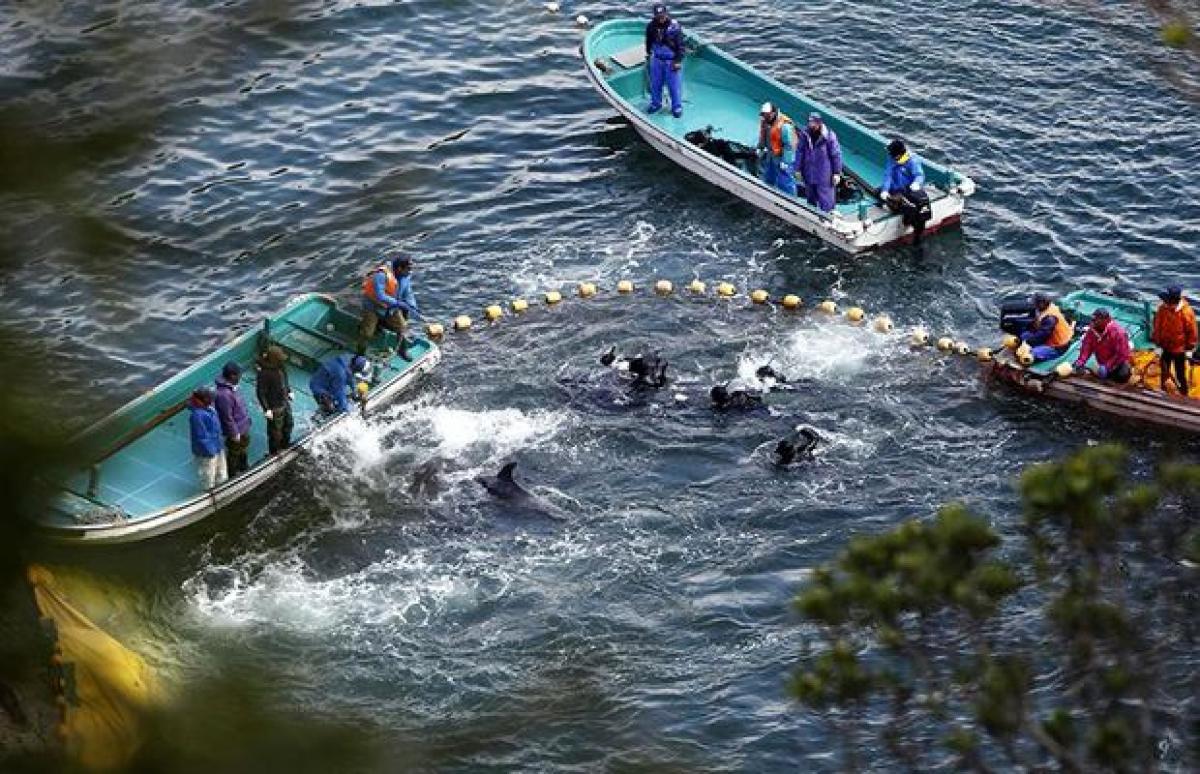Live
- Karthigai Deepam Wishes: WhatsApp Status, Messages to Celebrate the Festival of Light
- Top Different Industry Trends of 2024 and What to Expect in 2025
- India’s Leading Lending Platforms: How Technology is Transforming Credit Access
- Govt healthcare: Long hours of unavoidable waiting for poor
- Readymade models rule the roost
- Teacher masterminds fake certificate racket!
- Villagers stage protest for road
- Daily Horoscope for December 13, 2024: What Are Your Stars Saying Today
- Officials to provide infrastructure to resettlement villages in tiger zone: DC
- Additional Collector inspects Collectorate
Just In

x
Highlights
A small Japanese town kicked off its controversial dolphin hunt on Thursday after bad weather delayed the start, according to a local fisheries official, while a separate whaling hunt was due to start at the weekend.
A small Japanese town kicked off its controversial dolphin hunt on Thursday after bad weather delayed the start, according to a local fisheries official, while a separate whaling hunt was due to start at the weekend.
.jpg)
But the dolphin-hunt boats returned to Taiji's port -- thrust into the global spotlight in the Oscar-winning 2009 documentary "The Cove" -- having failed to trap any of the mammals.
"Twelve boats set out for the hunt, but they returned with no catch," a Taiji fisheries spokeswoman told AFP.
They will set sail again on Friday if the weather allows, she added. The six-month season was due to start Tuesday. In the annual hunt, people from the southwestern town corral hundreds of dolphins into a secluded bay and butcher them, turning the water crimson red.
The scene was featured in "The Cove" documentary, drawing unwanted attention to the little coastal community.
Environmental campaigners visit the town every year to watch the gruesome event and authorities have boosted their presence to prevent any clashes between locals and activists.
Some of the dolphins are sold to aquariums.
Defenders of the hunt say it is a tradition and point out that the animals are not endangered, a position echoed by the Japanese government.
On Wednesday, Japanese police said that they had released US animal rights activist Ric O'Barry, who trained dolphins for the TV show "Flipper", after he was arrested near Taiji for not carrying his passport.
Separately, Japanese fisheries officials have announced they would start an annual coastal whaling hunt with plans to catch 51 minke whales over the next two months, part of what Tokyo says is research but which has attracted strong criticism abroad.
Four ships will operate within a 50-kilometre (30-mile) radius off Kushiro in Japan's northernmost Hokkaido island, the fisheries agency said.
Tokyo argues that the programme is permitted under the International Convention for the Regulation of Whaling, and is aimed at better understanding whale behaviour.
But Japan's whaling programme -- including another hunt in the Southern Ocean -- has angered Western conservationists and many of its friendly nations, including the United States.
In June, Japan's chief whaling negotiator said ships would return to the Antarctic this year, despite a call by global regulators to provide more evidence that the hunt has a scientific purpose.
Despite international disapproval, Japan has hunted whales in the Southern Ocean under an exemption in the global whaling moratorium that allows for lethal research.
Last year, the highest court of the United Nations, the International Court of Justice, ruled that the annual Southern Ocean expedition was a commercial hunt masquerading as science to skirt the international moratorium.

Next Story
More Stories
ADVERTISEMENT
© 2024 Hyderabad Media House Limited/The Hans India. All rights reserved. Powered by hocalwire.com







